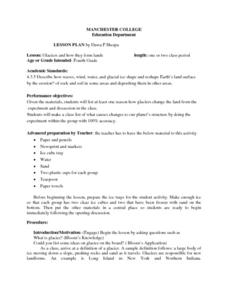Curated OER
Adopt An Animal
Students view slides of pictures of rare animals and make predictions about them based on the characteristics they see. In this animals lesson plan, students then research one of the animals and present their findings to the class.
Curated OER
Aquatic Organisms
Students create a poster describing the five characteristics of a salt water organism compared to a fresh water organism.
Curated OER
What About Pumpkins
Second graders read 'Big Pumpkin' by Eric Silverman. In teams of 'pumpkin investigators', using real pumpkins, they discover how a pumpkin feels and smells, how much one weighs, and determine which group has the largest pumpkin.
Curated OER
Glaciers and How They Form lands
As a whole class, the students define glacier and perform an experiment involving glaciers. The students brainstorm ideas of what a glacier is, and narrow the ideas down to a definition. The students then participate in an activity that...
Curated OER
Lesson Design Protocol: Add and Subtract
Addition and subtraction are studied in this math instructional activity. Upper graders add and subtract whole numbers up to 1,000 with and without regrouping.
Curated OER
The Search for Centimeters
Investigate the length of various objects in metrics! In this measurement lesson, 2nd graders estimate and find the length of objects in the classroom using centimeters.
Indiana Science
How Many E’s?
Seventh graders explore random sampling by estimating the number of e's on the newspaper. They explain the possible error sources for this type of sampling, and compare the accuracy of sampling a small and large population. This is a...
Teach Engineering
Light Up Your Life
How do lighting types affect energy efficiency? Explore different types of lighting and the energy they use. Pupils learn about types of lights and calculate the energy used during a typical school year. They discover that being energy...
Curated OER
George Winter Lesson Plan 3
Bring language arts and U.S. history together in this lesson, which prompts middle and high schoolers to gather biographical information about Abraham Lincoln. They compare and contrast information written about his childhood and discuss...
Curated OER
Ice Cream Lesson Plan for Kindergarten
Students explore how ice cream is made in a factory and at home. They help make ice cream in the classroom. They measure out the ingredients. Students share the ice cream when it is done.
Curated OER
Smoking Out Valid Information About Smoking
Eighth graders work in teams to investigate the authority, accuracy, objectivity, currency & coverage of web sites related to tobacco use. They have previously been taught the concepts of authority, accuracy, objectivity, currency...
Curated OER
Electrifying Franklin
Fourth graders research and present information about Benjamin Franklin's life and accomplishments. For this lesson on Benjamin Franklin, 4th graders review idioms and sayings written by Franklin then compare and contrast his various...
Curated OER
A Plop and Fizz
Seventh graders perform an experiment to determine the effect of temperature on reaction rates. In this chemistry lesson, 7th graders take measurements and record data. They create a graph and analyze results.
Curated OER
So Fast! So Slow!
Fifth graders give examples of objects that move slow and fast. In this physics lesson, 5th graders rank animals according to how quickly they move. They create a bar graph of organisms versus rates of speed.
Curated OER
Break the Code!
Seventh graders crack a code using binary numbers. In this technology lesson, 7th graders explain how binary codes can represent letters and numbers. They create their own code and exchange them with their classmates.
Curated OER
“Leading Doctors Say…”
Seventh graders analyze how media and celebrities influence consumers. In this social studies lesson, 7th graders view different commercials and discuss their advertising techniques. They explain why celebrities are often used to give...
Curated OER
Take Another Look
Seventh graders analyze different types of graphs and answer questions related to each. In this math lesson, 7th graders organize a given diagram to make it easier to interpret. They discuss why they made such changes.
Curated OER
Veggie Chop and Data Analysis
First graders chop vegetables into fractions. In this fractions lesson, 1st graders cut vegetables, collect data about favorite vegetables and create a bar graph using the information. Students make inferences about the data and record...
Curated OER
It's Greek To Me!
For this language lesson, scholars use Greek root meanings to determine the meaning of words. After being shown how Greek roots are used in many words, such as, photosynthesis, pairs are given two excellent black line masters embedded in...
Curated OER
Express Yourself
First graders identify details that make reading and writing more interesting. They classify events, people, places, and things and attach specific characteristics to each one. Everyone generates describing words on a worksheet that's...
Curated OER
Batteries in Series
Eighth graders examine batteries in a series circuit and the associated voltage. They determine, through inquiry and problem solving, that the total voltage of batteries in a series is the sum of the voltage of each battery. They design...
Curated OER
Mind Your P's and C's!
Second graders estimate how much volume a container can hold. In this math lesson plan, 2nd graders compare their estimates with actual measurements. They share and discuss their results in class.
Curated OER
Estimation and Computation
Second graders practice their estimation skills using blocks. In this math lesson, 2nd graders explain how estimating makes addition easier. They complete a worksheet after the lesson to reinforce new learning.
Curated OER
Marvelous Marbles
Students predict the change in water volume when adding marbles to a graduated cylinder. In this Chemistry lesson plan, students will need to make accurate water measurements to determine the fluid displaced by the marbles. The students...

























